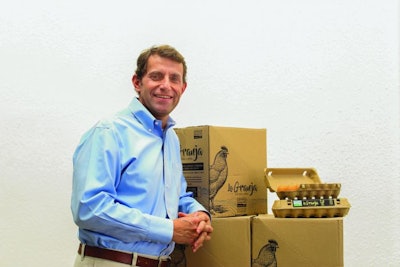
Proa is Chile’s largest egg producer. With a 2-million-layer capacity, it primarily sells eggs from cage facilities, but also produces cage-free eggs and egg products sold into the wider food industry as ingredients. It also sells pullets.
Proa, primarily operates in the fields of pet food and animal feed and entered the Chilean market for eggs in the 1960s, growing to capture about 10% of the highly fragmented Chilean market.
The egg division comprises five subsidiaries. Avícola Andina produces battery eggs and has a hatchery and grow out houses. It also produces feed and has its own distribution system. Avícola Valle Central, also produces eggs, while Premium processes the group’s own eggs and those of third parties. Ovotrading, for its part, manufactures layer feeds for internal use. Additionally, Proa represents genetics company Lohmann Breeders in Chile.
The Proa group of companies remains family-operated, established in 1939 by the grandfather and father of current general manger Benedicto Aguado.
It was not until the 1960s that Proa entered egg production, and subsequently the production of egg products, and, according to Aguado, the development of the business has been guided by a simple aim – to add value.
Growth trajectory
The egg division has grown both organically and through acquisitions.
At the start of the 1990s, a change in management within the company saw new technology introduced at one of the company’s original sites in the village of Leyda, Valparaiso. The site, home to 1.1 million layers, saw processes automated and animal welfare improved.
In 2006, the company bought Chile’s third largest egg producer, Avícola La Granja, which resulted in a significant increase in the flock under the company’s management. Adding La Granja’s two facilities, in Melpilla and Pelarco, to the Leyda facility and Proa’s other farms in the center of Chile brought the total number of birds under the company’s management to 2 million.
2006 also saw the company purchase an egg processing company. This was followed by the acquisition of a second egg processing company in 2010 giving the company a significant foothold in the sector.
The company’s expansion plans, however, were not without setbacks. In 2010, the country’s strongest earthquake since the 1960s resulted in the loss of 400,000 birds and numerous battery cages.
Proa’s Pelarco site, 200 km south of Santiago, was close to the quake’s epicenter and, Aguado notes, almost all of the 550,000-600,000 bird capacity was lost.
This loss resulted in the decision to close the Pelarco complex and to concentrate on developing the Melpilla site, giving the company two complexes with 1 million birds each, Leyda and Melpilla. The distance between the two sites is close enough to offer management economies of scale, but they are far enough apart to ensure biosecurity.
Melpilla was redeveloped to house cage-free birds in addition to battery hens. The old, outdated farms now have the latest generation aviaries and are home to 100,000 birds. Its cage-free eggs are sold under the brand name La Granja.
There was a steep learning curve to be completed to produce cage-free and, according to Aguado, it required learning to produce as his grandfather had done.
Sales channels
The primary sales channel in Chile remains markets and small shops, which account for 65-75% of the market, while supermarkets account for the remaining 25-30%, and it is here that Proa focuses its attention.
The supermarket channel is highly competitive and Proa, as do other egg manufacturers, makes significant efforts to promote and position its brands, making the most of its eggs’ distinct attributes.
Its primary supermarket brand is Yemita and, during the pandemic Yemita eggs had the distinguishing feature of being stamped with health messages encouraging consumers to care of themselves and to avoid spreading the disease.
The processed egg market in Chile primarily comprises liquid eggs, and accounts for approximately 8% of egg sales in the country. For this market Proa offers mixes, such as liquid egg with additional yolk, sold primarily to food processing companies.
Relationships
Proa is an active member of industry association ChileHuevos, which helps it shape campaigns and regulatory change. Through ChileHuevos, the company has also been able to work with the Ministry of Agriculture’s livestock health service, particularly important for Proa as animal health is a key pillar of its business.
Top Latin American broiler, layer rankings for 2021
www.wattagnet.com/articles/44567


















